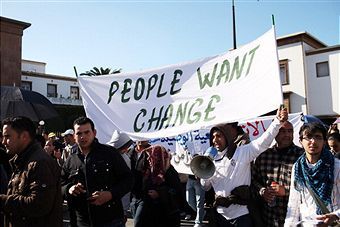 Whether revolutions devour their own children often depends on the ability of a
post-revolutionary government to deliver political freedom, jobs and services. Egypt is no different. If the economy opens up, then the country’s transition to democracy is likely to continue. If
not, then anything can happen.
Whether revolutions devour their own children often depends on the ability of a
post-revolutionary government to deliver political freedom, jobs and services. Egypt is no different. If the economy opens up, then the country’s transition to democracy is likely to continue. If
not, then anything can happen.
So, which will it be? The stock exchange has reopened and is doing better than many expected. The government is bullish about growth, but it is hard to see where it will come from. Tourists, who account for a major part of the economy, are staying at home. Hotels are empty and BA is cancelling flights due to lack of passengers.
The uncertainty about Egypt’s future economic path is also deterring investors. Though fears of a lurch to the left in the near-future are probably overstated, economic liberalisation and an end to cronyism are connected in most people’s minds. It is not yet clear which businesspeople will be prosecuted for their dealings during the Mubarak regime. As a result, those with money are at pains not to attract attention by making large transactions. Foreign companies, in turn seem to fear entering into partnerships with local counterparts, as their money may soon be confiscated.
Then there is debt servicing: a major problem for Egypt’s rulers. Mubarak pillaged Egypt’s economy, and left office with as much as $70 billion in his family’s bank account while bequeathing $30 billion in debt to the Egyptian people. Renegotiation of this will require a conversation with the IMF about a range of subsidies, particularly on fuel, as well as the different energy deals the Mubarak regime cut not just with Israel but also a number of European governments. Resolution and stability remain far off; the situation is very delicate.






Comments